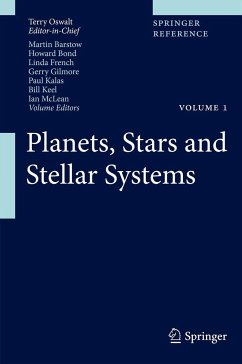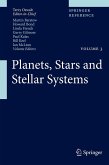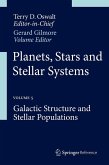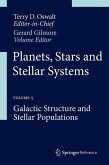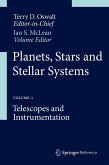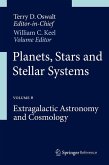Planets, Stars and Stellar Systems is a compendium of modern astronomical research covering subjects of key interest to the main fields of contemporary astronomy. The six volumes of the set edited by Terry Oswalt (Editor-in-Chief) comprise:
Volume 1: Telescopes and Instrumentation - Ian McLean (Ed.)
Volume 2: Astronomical Techniques, Software, and Data - Howard E. Bond (Ed.)
Volume 3: Solar and Stellar Planetary Systems - Linda French; Paul Kalas (Eds.)
Volume 4: Stellar Structure and Evolution - Martin A. Barstow (Ed.)
Volume 5: Stellar Systems and Galactic Structure - Gerard Gilmore (Ed.)
Volume 6: Extragalactic Astronomy and Cosmology - William C. Keel (Ed.)
Each of the approximately 85 chapters is written by a practicing professional within the appropriate sub-discipline. They include sufficient background material and references to the current literature to allow one to learn enough about a specialty within astronomy, astrophysics and cosmology to get started on a practical research project. In the spirit of the series Stars and Stellar Systems published by Chicago University Press in the 1960s and 1970s each chapter of Planets, Stars and Stellar Systems stands on its own as a fundamental review of its respective sub-discipline and each volume can be used as a text or recommended reference for advanced undergraduate or postgraduate courses. Advanced students through professional astronomers in their roles as both lecturers and researchers will welcome Planets, Stars and Stellar Systems as comprehensive and pedagogical reference to astronomy, astrophysics and cosmology.
Volume 1: Telescopes and Instrumentation - Ian McLean (Ed.)
Volume 2: Astronomical Techniques, Software, and Data - Howard E. Bond (Ed.)
Volume 3: Solar and Stellar Planetary Systems - Linda French; Paul Kalas (Eds.)
Volume 4: Stellar Structure and Evolution - Martin A. Barstow (Ed.)
Volume 5: Stellar Systems and Galactic Structure - Gerard Gilmore (Ed.)
Volume 6: Extragalactic Astronomy and Cosmology - William C. Keel (Ed.)
Each of the approximately 85 chapters is written by a practicing professional within the appropriate sub-discipline. They include sufficient background material and references to the current literature to allow one to learn enough about a specialty within astronomy, astrophysics and cosmology to get started on a practical research project. In the spirit of the series Stars and Stellar Systems published by Chicago University Press in the 1960s and 1970s each chapter of Planets, Stars and Stellar Systems stands on its own as a fundamental review of its respective sub-discipline and each volume can be used as a text or recommended reference for advanced undergraduate or postgraduate courses. Advanced students through professional astronomers in their roles as both lecturers and researchers will welcome Planets, Stars and Stellar Systems as comprehensive and pedagogical reference to astronomy, astrophysics and cosmology.

